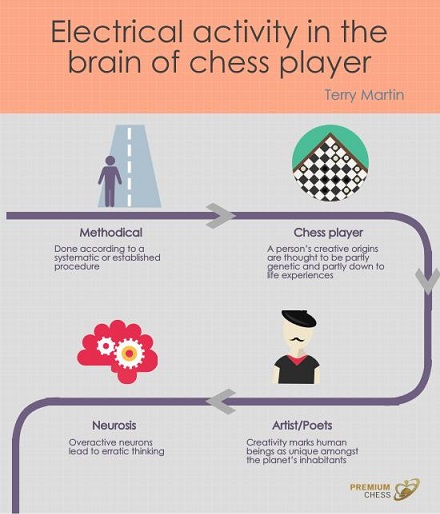
The creative mind of a chess player
According to Bobby Fischer:
‘A strong memory, concentration, imagination, and a strong will is required to become a great chess player.’
To pit your logic against your opponent’s, maintain concentration and then come up with a flash of genius when required is no mean feat. Based on genuine academic research, this post attempts to explain why logic and creativity are like opposing black and white armies on a chess board.
So what is creativity? Explanations have varied throughout the years, but owing to modern neuroscience, it is now thought to be electrical activity in the temporal lobes. These lobes are located just above your ears. We all have creativity, but it affects some more than others.
A person’s creative origins are thought to be partly genetic and partly down to life experiences. It can’t be pure coincidence that so many great writers have suffered hardships over the course of their lives. Repressed experiences are essential for creativity to work. If you see, hear, smell, touch or taste something that triggers a feeling of déjà vu, this is the neurons in the right temporal lobe being called into action. Creative insight (when an idea just comes out of nowhere) occurs when these neurons fire in a certain way.

Too much creativity is not a good thing. Indeed, it’s better to have too little. The simple diagram below demonstrates the effects too much or too little electrical activity can have on the way we think.
Overactive neurons lead to erratic thinking. For a chess player, this is a problem as it makes concentration virtually impossible. It is believed that too much electrical activity and therefore too much creativity leads to neuroses such as psychosis. Sufferers of such conditions are unable to tell reality from experiences repressed in their sub conscious. (Which we all have access to when we dream.)
Too little creativity makes life too methodical, like a series of steps that must be carried out to achieve a task. Ever wondered why you enjoy a particular piece of music so much, or why a TV programme holds your attention? This is another functioning of creativity. Without creativity, music would be a jumble of incoherent noises. TV programmes would be a series of events without a story. It is thought that this is how the human mind worked before it evolved creativity.
Creativity marks human beings as unique amongst the planet’s inhabitants. It is the culmination of four million years of evolution that has provided the platform for all of man’s technological advances. Creativity, born of a combination of genetics and life experiences is what gives us our unique skills and abilities to make our way in life.
Got anything to add? Could anything be learnt from psycho analysing a chess match? What do you think are the essential attributes for a great chess player? Have your say in the comments.
Back